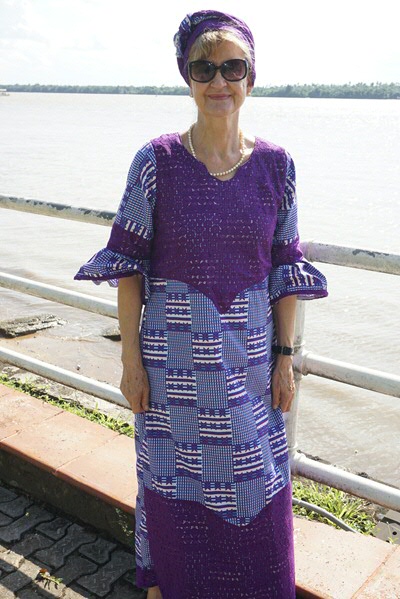New Gerardus van der Leeuw Fellow Rosalind Hackett

Prof. Rosalind I.J. Hackett will be joining the Faculty of Theology and Religious Studies as the third Gerardus van der Leeuw Fellow from August to December 2018. During this period, she will teach several classes on her research interests in religion in African conflicts, gender and Pentecostalism in Africa, African indigenous religions and religious freedom, and sound and material religion, and will be completing numerous writing projects. What are Rosalind’s first impressions of the Faculty and what are her plans for this fellowship period?
First impressions
Rosalind Hackett: 'My first impressions of the Faculty, the University and the city of Groningen are extremely favourable, not just because they are attractive and historic, but also due to the strong presence of this renowned University in the urban context. I love the synergy between the old buildings and the youthful character of the city. I look forward to feedback from students and colleagues on my research, and contributing to prevailing discussions in the Faculty about critical and imaginative ways of studying religious belief, expression and practice in our fast-changing, globally interconnected world. I am also looking forward to being free from administrative and teaching responsibilities at my own university, and having more time to concentrate for long periods of time on reading and writing in a conducive academic environment. On top of this, I am excited by the prospect of sustained conversations with several colleagues in Religious Studies and cognate areas whose research interests overlap with mine. There is more here than I imagined given all the research clusters and productive academic staff!'
‘Pilgrimage’ to Groningen
What was the inducement for Rosalind’s fellowship in Groningen? 'I was trained in the History of Religions in the UK and so it feels like a pilgrimage, as well as a great honour, to come to the academic home of one of the founders of the field: Gerardus van der Leeuw. But I was also keen to find out more about the lively programme in Religious Studies that has developed here, with its topical research areas and dynamic staff and students. Furthermore, I wanted a sabbatical experience in Europe this time and the Netherlands rose to the top of my list! As I said, I love the synergy between the old buildings and the youthful character of the city of Groningen. I appreciate the opportunity to be able to experience this on foot, with all the delightful shops, cafés, and canals along the way.'

Religions of Africa
Rosalind Hackett’s early interest in the academic study of religion grew from a World Religions course in high school, followed by some memorable comparative religion courses in her early undergraduate years at the University of Leeds. Her main area of specialization is the religions of Africa, notably new religious movements, including the current wave of Pentecostalism. She has also focused on media, art, gender, and conflict in relation to religion in the African context. Rosalind is currently doing field research on African indigenous religious responses to globalization, notably in terms of festivals, heritage projects, and world music. Over the last decade, her research has taken a sonic turn and she has been exploring the fascinating relationship between sound, hearing, and religion.
Research on emergent or neglected areas in the study of religion
Professor Hackett comments: 'I like to conduct research on emergent or neglected areas in the study of religion, many of which are relevant to understanding people’s changing religious worlds, whether in Africa or beyond. I consider that my research, which is informed by extensive international travel and field experience, has both humanistic and social scientific value. My fellowship in Groningen will give me access to the people and publications of this institution and region that have the potential to challenge and expand my thinking on my current research projects.'
Prof. Rosalind Hackett
Rosalind Hackett is Distinguished Professor in the Humanities and Professor of Religious Studies at the University of Tennessee, USA. She has also taught in the UK and Nigeria. In the past four decades, she has held fellowships at the University of Aberdeen, the University of Notre Dame, the University of Cape Town, and Harvard Law School, among others. Rosalind has more than nine years of field experience, teaching and researching in Africa. In 2014/2015 she was Visiting Professor in Women’s Studies and Religion at Harvard Divinity School.
Gerardus van der Leeuw Fellowship
The Faculty introduced the Gerardus van der Leeuw Fellowship to invite renowned international researchers in the field of Religion and Culture to come to Groningen for a period of at least six weeks. In this period, Fellows actively contribute to the Faculty's teaching and research, for example by giving lectures and Master Classes to students. The Fellowship was named after the Netherlands' most internationally renowned religious studies expert, Gerardus van der Leeuw (1890-1950). Van der Leeuw was Professor of History of Religions at the University of Groningen (1918-1946) and Minister of Education, Arts and Sciences in the first Dutch cabinet after the Second World War.
Previous Gerardus van der Leeuw Fellows:
- Prof. dr. Frank Heidemann (2014)
- Prof. dr. Paul Rasor (2015)
| Last modified: | 03 November 2023 5.10 p.m. |
More news
-
05 March 2025
Women in Science
The UG celebrates International Women’s Day with a special photo series: Women in Science.
-
10 February 2025
Project GRACE: An ENLIGHT ETN Grant Winner
We are happy to announce that the project GRACE, with Julia Martínez-Ariño as the main coordinator, is one of the projects selected for the ENLIGHT 2024 Call. Congratulations to the GRACE team.
